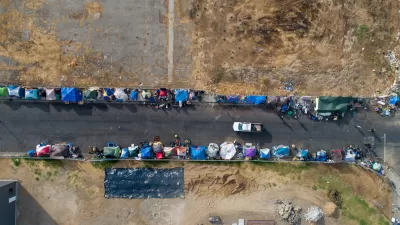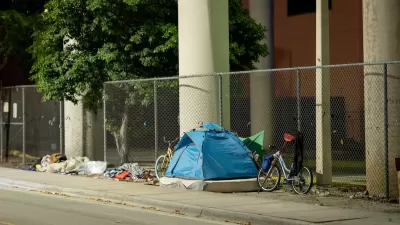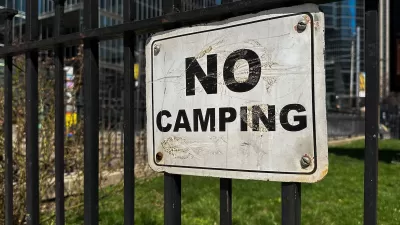The decision sets the stage for what could be a fierce battle over homelessness policy.

In a decision that will likely have major ripple effects on housing and homelessness policy across the nation, the United States Supreme Court ruled in favor of the city of Grants Pass, Oregon in a case that hinges on unhoused people’s right to sleep outside.
As Jennifer Ludden explains in an article for NPR, “The justices, in a 6-3 decision along ideological lines, overturned lower court rulings that deemed it cruel and unusual under the Eighth Amendment to punish people for sleeping outside if they had nowhere else to go.”
The justices, in a 6-3 decision along ideological lines, overturned lower court rulings that deemed it cruel and unusual under the Eighth Amendment to punish people for sleeping outside if they had nowhere else to go.
According to Ludden, “Today’s ruling only changes current law in the 9th Circuit Court of Appeals, which includes California and eight other Western states where the bulk of America’s unhoused population lives. But it will also determine whether similar policies elsewhere are permissible; and it will almost certainly influence homelessness policy in cities around the country.”
Advocates around the country are decrying the Grants Pass v. Johnson decision. In a statement, Rafa Sonnenfeld, Policy Director at YIMBY Action and YIMBY Law, said, “This decision will prevent people from sheltering themselves when they have no alternatives in their community; and it will create more barriers to their ability to access resources they need while on a path to being securely housed.” Laura Foote, Executive Director at YIMBY Action, added that the ruling will do nothing to address the root causes of rising homelessness rates, saying, “Only homes can end homelessness.”
FULL STORY: The Supreme Court says cities can punish people for sleeping in public places

Alabama: Trump Terminates Settlements for Black Communities Harmed By Raw Sewage
Trump deemed the landmark civil rights agreement “illegal DEI and environmental justice policy.”

Study: Maui’s Plan to Convert Vacation Rentals to Long-Term Housing Could Cause Nearly $1 Billion Economic Loss
The plan would reduce visitor accommodation by 25% resulting in 1,900 jobs lost.

Why Should We Subsidize Public Transportation?
Many public transit agencies face financial stress due to rising costs, declining fare revenue, and declining subsidies. Transit advocates must provide a strong business case for increasing public transit funding.

Paris Bike Boom Leads to Steep Drop in Air Pollution
The French city’s air quality has improved dramatically in the past 20 years, coinciding with a growth in cycling.

Why Housing Costs More to Build in California Than in Texas
Hard costs like labor and materials combined with ‘soft’ costs such as permitting make building in the San Francisco Bay Area almost three times as costly as in Texas cities.

San Diego County Sees a Rise in Urban Coyotes
San Diego County experiences a rise in urban coyotes, as sightings become prevalent throughout its urban neighbourhoods and surrounding areas.
Urban Design for Planners 1: Software Tools
This six-course series explores essential urban design concepts using open source software and equips planners with the tools they need to participate fully in the urban design process.
Planning for Universal Design
Learn the tools for implementing Universal Design in planning regulations.
Smith Gee Studio
Alamo Area Metropolitan Planning Organization
City of Santa Clarita
Institute for Housing and Urban Development Studies (IHS)
City of Grandview
Harvard GSD Executive Education
Toledo-Lucas County Plan Commissions
Salt Lake City
NYU Wagner Graduate School of Public Service





























